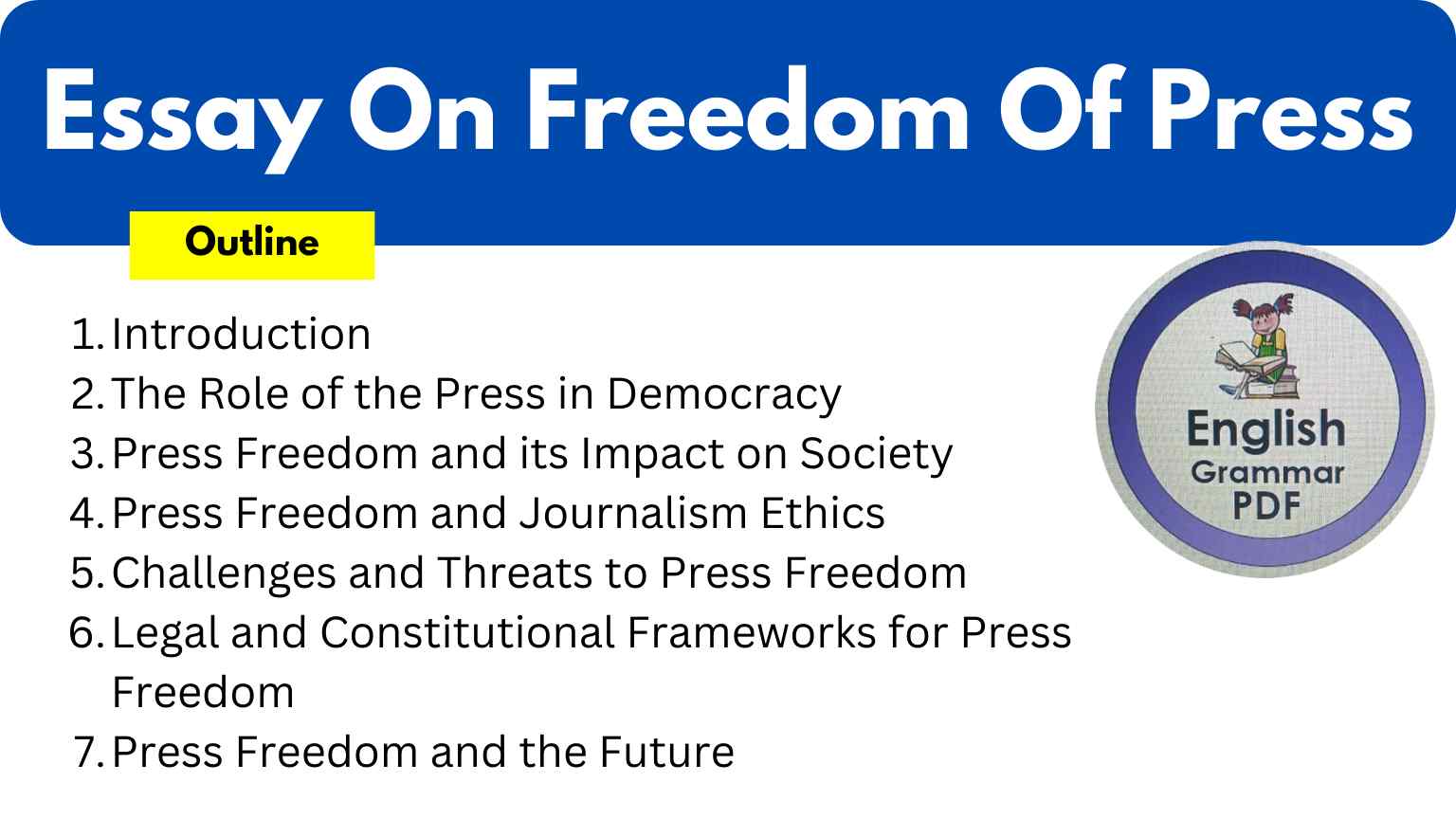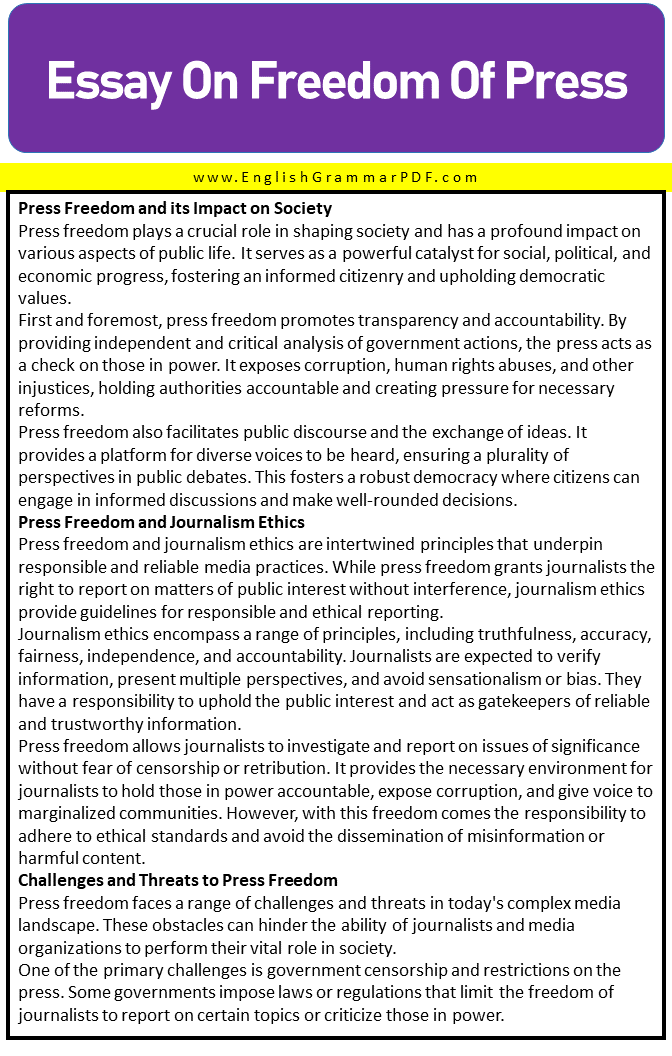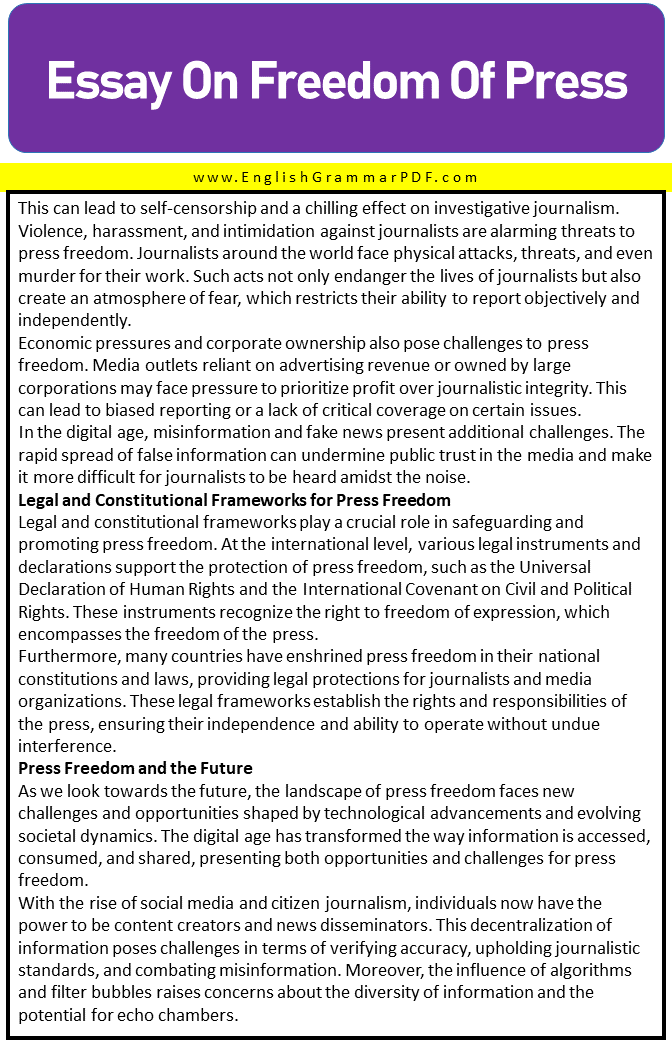Essay On Freedom Of Press
Outline of Essay:
- Introduction
- The Role of the Press in Democracy
- Press Freedom and its Impact on Society
- Press Freedom and Journalism Ethics
- Challenges and Threats to Press Freedom
- Legal and Constitutional Frameworks for Press Freedom
- Press Freedom and the Future
Introduction
Freedom of the press is a fundamental principle that underpins democratic societies and plays a vital role in upholding transparency, accountability, and the protection of human rights. It encompasses the freedom of journalists and media organizations to gather and disseminate information without censorship or undue interference. The importance of press freedom cannot be overstated, as it enables the public to access diverse perspectives, holds those in power accountable, and facilitates informed decision-making. In this essay, we will explore the significance of press freedom, its historical context, legal frameworks, and the role of the press in democracy. We will also examine the challenges and threats faced by press freedom and its impact on society.
The Role of the Press in Democracy
The role of the press in a democracy is of paramount importance, serving as a crucial pillar that upholds the principles of transparency, accountability, and informed decision-making. The press acts as the Fourth Estate, providing a check on the powers of government and other institutions, ensuring that they act in the best interests of the public.
One of the key roles of the press is to promote transparency by gathering and disseminating information to the public. Through investigative journalism, the press uncovers hidden truths, exposes corruption, and holds those in power accountable for their actions. By providing citizens with access to reliable and unbiased information, the press enables individuals to make informed decisions and actively participate in democratic processes.
Furthermore, the press acts as a platform for public discourse, allowing diverse voices and opinions to be heard. It provides a space for debate and discussion on important social, political, and economic issues, contributing to a well-informed citizenry and a robust democratic society.
Press Freedom and its Impact on Society
Press freedom plays a crucial role in shaping society and has a profound impact on various aspects of public life. It serves as a powerful catalyst for social, political, and economic progress, fostering an informed citizenry and upholding democratic values.
First and foremost, press freedom promotes transparency and accountability. By providing independent and critical analysis of government actions, the press acts as a check on those in power. It exposes corruption, human rights abuses, and other injustices, holding authorities accountable and creating pressure for necessary reforms.
Press freedom also facilitates public discourse and the exchange of ideas. It provides a platform for diverse voices to be heard, ensuring a plurality of perspectives in public debates. This fosters a robust democracy where citizens can engage in informed discussions and make well-rounded decisions.
Press Freedom and Journalism Ethics
Press freedom and journalism ethics are intertwined principles that underpin responsible and reliable media practices. While press freedom grants journalists the right to report on matters of public interest without interference, journalism ethics provide guidelines for responsible and ethical reporting.
Journalism ethics encompass a range of principles, including truthfulness, accuracy, fairness, independence, and accountability. Journalists are expected to verify information, present multiple perspectives, and avoid sensationalism or bias. They have a responsibility to uphold the public interest and act as gatekeepers of reliable and trustworthy information.
Press freedom allows journalists to investigate and report on issues of significance without fear of censorship or retribution. It provides the necessary environment for journalists to hold those in power accountable, expose corruption, and give voice to marginalized communities. However, with this freedom comes the responsibility to adhere to ethical standards and avoid the dissemination of misinformation or harmful content.
Challenges and Threats to Press Freedom
Press freedom faces a range of challenges and threats in today’s complex media landscape. These obstacles can hinder the ability of journalists and media organizations to perform their vital role in society.
One of the primary challenges is government censorship and restrictions on the press. Some governments impose laws or regulations that limit the freedom of journalists to report on certain topics or criticize those in power. This can lead to self-censorship and a chilling effect on investigative journalism.
Violence, harassment, and intimidation against journalists are alarming threats to press freedom. Journalists around the world face physical attacks, threats, and even murder for their work. Such acts not only endanger the lives of journalists but also create an atmosphere of fear, which restricts their ability to report objectively and independently.
Economic pressures and corporate ownership also pose challenges to press freedom. Media outlets reliant on advertising revenue or owned by large corporations may face pressure to prioritize profit over journalistic integrity. This can lead to biased reporting or a lack of critical coverage on certain issues.
In the digital age, misinformation and fake news present additional challenges. The rapid spread of false information can undermine public trust in the media and make it more difficult for journalists to be heard amidst the noise.
Legal and Constitutional Frameworks for Press Freedom
Legal and constitutional frameworks play a crucial role in safeguarding and promoting press freedom. At the international level, various legal instruments and declarations support the protection of press freedom, such as the Universal Declaration of Human Rights and the International Covenant on Civil and Political Rights. These instruments recognize the right to freedom of expression, which encompasses the freedom of the press.
Furthermore, many countries have enshrined press freedom in their national constitutions and laws, providing legal protections for journalists and media organizations. These legal frameworks establish the rights and responsibilities of the press, ensuring their independence and ability to operate without undue interference.
Press Freedom and the Future
As we look towards the future, the landscape of press freedom faces new challenges and opportunities shaped by technological advancements and evolving societal dynamics. The digital age has transformed the way information is accessed, consumed, and shared, presenting both opportunities and challenges for press freedom.
With the rise of social media and citizen journalism, individuals now have the power to be content creators and news disseminators. This decentralization of information poses challenges in terms of verifying accuracy, upholding journalistic standards, and combating misinformation. Moreover, the influence of algorithms and filter bubbles raises concerns about the diversity of information and the potential for echo chambers.
Technological advancements, such as artificial intelligence and deepfake technology, further complicate the landscape of press freedom. While these technologies offer innovative storytelling methods, they can also be used to manipulate information and deceive the public.
FAQ’s
What is freedom of the press and why is it important?
Freedom of the press refers to the right of journalists and media organizations to publish information without censorship or government interference. It is important because it ensures transparency, accountability, and the free flow of information in a democratic society.
Who said freedom of the press?
The phrase “freedom of the press” was famously stated by Thomas Jefferson, one of the Founding Fathers of the United States and the principal author of the Declaration of Independence.
Why do we need journalists?
We need journalists because they play a crucial role in society by providing accurate and timely information. They investigate and report on important issues, hold those in power accountable, give voice to marginalized communities, and help shape public opinion. Journalists act as watchdogs, safeguarding democracy and promoting transparency.
Download the PDF of the Essay:
Explore More Essays:






